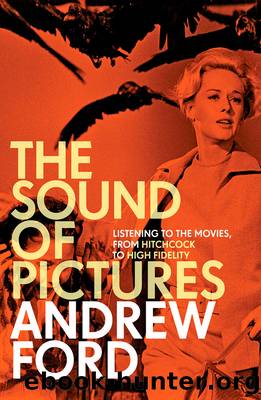The Sound of Pictures by Ford Andrew;

Author:Ford, Andrew;
Language: eng
Format: epub
Tags: MUS000000, PER004000
ISBN: 1887549
Publisher: Black Inc.
Published: 2010-12-01T00:00:00+00:00
The Sound of Voices
Herman Melvilleâs novella Billy Budd is set on board a British man oâ war during the Napoleonic wars. Billy, a popular, too-handsome boy, pressed into service from a passing merchant ship, is victimised by Claggart, the sadistic master-at-arms, and finally provoked into striking him. As a result of the blow, Claggart dies. Billy is found guilty of murder by a drumhead court, then hanged in front of the entire shipâs company. The moment before his hanging, Billy asks God to bless the shipâs captain. This is how Melville describes what happens next:
The silence at the moment of execution and for a moment or two continuing thereafter, a silence but emphasized by the regular wash of the sea against the hull or the flutter of a sail caused by the helmsmanâs eyes being tempted astray, this emphasized silence was gradually disturbed by a sound not easily to be verbally rendered. Whoever has heard the freshet-wave of a torrent suddenly swelled by pouring showers in tropical mountains, showers not shared by the plain; whoever has heard the first muffled murmur of its sloping advance through precipitous woods, may form some conception of the sound now heard. The seeming remoteness of its source was because of its murmurous indistinctness since it came from close-by, even from the men massed on the shipâs open deck. Being inarticulate, it was dubious in significance further than it seemed to indicate some capricious revulsion of thought or feeling such as mobs ashore are liable to, in the present instance possibly implying a sullen revocation on the menâs part of their involuntary echoing of Billyâs benediction.
You would think this moment made for film, but in Billy Budd (1962), the director, Peter Ustinov, lets it go. In place of Melvilleâs description of the inarticulate mass of protest, he has music. Thereâs nothing wrong with the rather dissonant, angular melodic line by the composer Antony Hopkins. Itâs effective enough. But the book sounds better.
Whether consciously or not, Anthony Mann brings Melvilleâs sound to life in The Fall of the Roman Empire (1964). At the death of Marcus Aurelius (Alec Guinness), the immediate sonic response comes courtesy of Dimitri Tiomkinâs very strange score (complete with a prominent harpsichord). But in the following scene, the conversation between Lucilla (Sophia Loren), Livius (Stephen Boyd) and Timonides (James Mason) is underpinned by a relentless wind moaning outside, as though the elements were in mourning. This is more like it, and the sound returns at the end of the ensuing funeral procession, when we see the Roman legions standing in the drifting snow. But now it is not the wind we hear, it is menâs voices. With their mouths hidden behind their shields, the soldiers stand motionless performing a horrifying ritual vocalisation, a wordless choral lament.
Human voices, massed or singly, have provided some of the most memorable sounds in more than eighty years of film history, but it is seldom remarked. In Fritz Langâs M, as early as 1931, voices are seemingly orchestrated, particularly in the crowd scenes.
Download
This site does not store any files on its server. We only index and link to content provided by other sites. Please contact the content providers to delete copyright contents if any and email us, we'll remove relevant links or contents immediately.
| Appreciation | Blank Sheet Music |
| Composition | Conducting |
| Exercises | Instruction & Study |
| Lyrics | MIDI, Mixers, etc |
| Philosophy & Social Aspects | Songwriting |
| Techniques | Theory |
| Vocal |
The Goal (Off-Campus #4) by Elle Kennedy(12456)
Kathy Andrews Collection by Kathy Andrews(10561)
Diary of a Player by Brad Paisley(6872)
What Does This Button Do? by Bruce Dickinson(5538)
Assassin’s Fate by Robin Hobb(5256)
Big Little Lies by Liane Moriarty(4894)
Pale Blue Dot by Carl Sagan(4021)
Sticky Fingers by Joe Hagan(3459)
The Heroin Diaries by Nikki Sixx(2943)
The Death of the Heart by Elizabeth Bowen(2911)
Beneath These Shadows by Meghan March(2731)
The Help by Kathryn Stockett(2711)
Confessions of a Video Vixen by Karrine Steffans(2686)
How Music Works by David Byrne(2541)
Jam by Jam (epub)(2499)
Harry Potter 4 - Harry Potter and The Goblet of Fire by J.K.Rowling(2423)
Strange Fascination: David Bowie: The Definitive Story by David Buckley(2371)
Petty: The Biography by Warren Zanes(2242)
Darker Than the Deepest Sea by Trevor Dann(2215)
